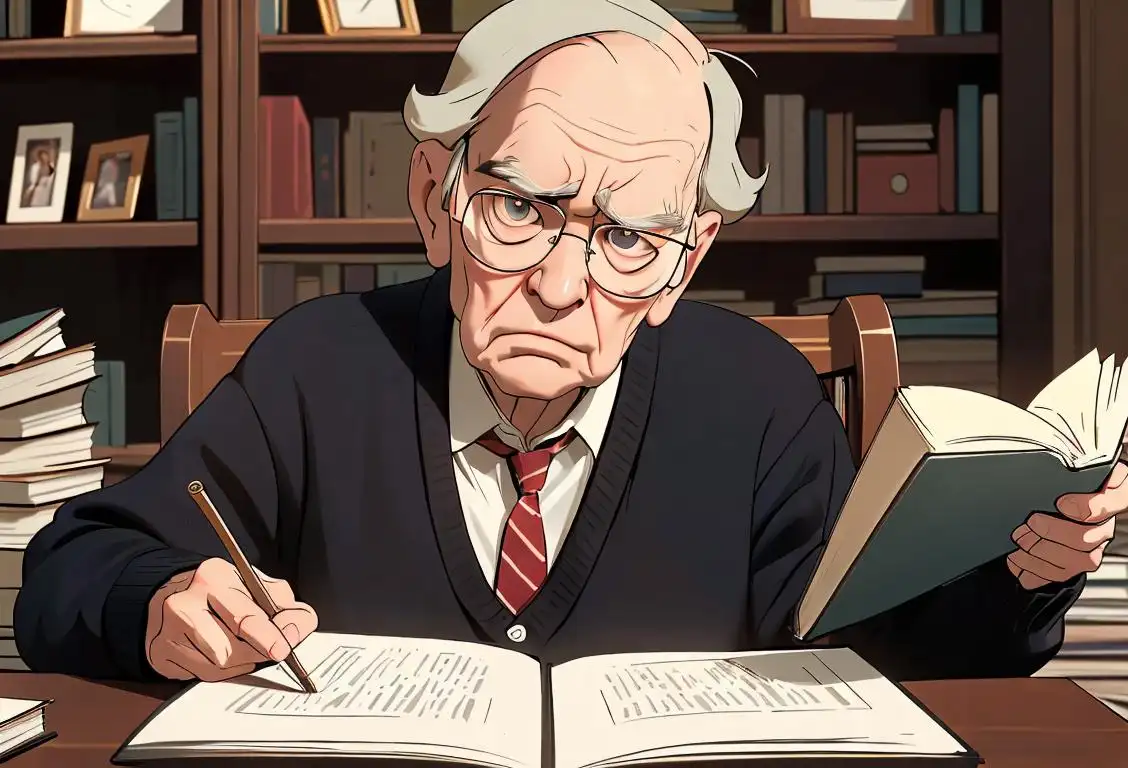National Curmudgeons Day

Hey there, curmudgeons and curmudgeonettes! Are you ready to celebrate the quirkiest day of the year? It's National Curmudgeons Day! Get ready to embrace your grumpiness and revel in your cantankerous ways. From the legendary internet battles to the inescapable desire to yell at kids to get off your lawn, this day is all about embracing the curmudgeon within. So, sit back, frown deeply, and let's dive into the fascinating world of National Curmudgeons Day!
When is Curmudgeons Day?
It's national curmudgeons day on the 29th January.
The Birth of National Curmudgeons Day
Every year on January 29th, curmudgeons of all shapes and sizes unite to celebrate their unique personalities on National Curmudgeons Day. But how did this delightfully grumpy holiday come into existence?
Well, it all started in the depths of the internet, where flame wars and snarky comments thrive. As netizens bemoaned the state of affairs and indulged in their penchant for grumbling, the idea of a day dedicated to curmudgeonly behavior was born.
But it wasn't just the internet that spurred the creation of National Curmudgeons Day. Curmudgeons have a long and storied history that dates back centuries. From the crotchety philosophers of ancient Greece to the scowling poets of the Romantic era, curmudgeons have left their mark on the annals of history.
Celebrating National Curmudgeons Day
So, how can you celebrate this grouchy occasion? Here are a few ideas to get you started:
- Complain about the weather. It's a classic curmudgeon move that never gets old!
- Perfect your grumpy face and practice your best eye-roll. You never know when you'll need to put those skills to good use.
- Write scathing reviews of everything you come across. From movies and books to your neighbor's taste in music, nothing is safe from your critical eye.
- Participate in a curmudgeonly debate on social media. Just remember to keep it civil...ish.
- Embrace your inner curmudgeon by wearing your grumpiness proudly. Whether it's a T-shirt that says, 'I'm Only Smiling on the Inside' or a mug that declares, 'World's Grumpiest Grump,' let the world know just how cantankerous you can be.
Remember, the goal of National Curmudgeons Day isn't to be mean-spirited or hurtful. It's about embracing our grumpiness in a lighthearted and fun way. So, let loose your inner curmudgeon and enjoy this special day!
History behind the term 'Curmudgeons'
1577
Origin of the Word 'Curmudgeon'
The term 'curmudgeon' first appeared in the English language in 1577. It was derived from the Middle English word 'curmudgen', which meant a miserly, churlish person. The exact origin of the word is unclear, but it is believed to have been derived from a variant of the word 'cur', meaning a surly or ill-tempered dog.
17th Century
Evolving Meaning: Miserly Nature
During the 17th century, the term 'curmudgeon' took on a more specific meaning, referring to someone who was not only ill-tempered but also miserly. It became associated with individuals who were perceived as being stingy or unwilling to spend money, often exhibiting a parsimonious attitude towards others.
18th Century
Shifting Perception: Eccentricity
In the 18th century, there was a subtle shift in the perception of curmudgeons. The term began to encompass individuals who displayed eccentric behavior or held unconventional beliefs. While the miserly nature of curmudgeons persisted, they were increasingly seen as odd or peculiar characters, adding a new layer of complexity to the term.
19th Century
Curmudgeons in Literature
The 19th century saw the rise of curmudgeons in literature. Authors like Charles Dickens and Mark Twain introduced memorable curmudgeon characters, giving the term a place in popular culture. These characters, such as Ebenezer Scrooge from 'A Christmas Carol' and Ebenezer Dorrit from 'Little Dorrit', further solidified the image of curmudgeons as miserly, grumpy individuals.
20th Century
Curmudgeons in Film and Television
In the 20th century, curmudgeons found their way onto the silver screen and television. Iconic characters like Oscar Madison from 'The Odd Couple' and Archie Bunker from 'All in the Family' showcased the grumpy, irritable side of curmudgeons but also added depth to their personalities. These portrayals popularized the term and made 'curmudgeon' a recognizable archetype.
Present Day
Modern Interpretation: Endearing Figures
In the modern era, curmudgeons have taken on a somewhat endearing quality. They are often seen as lovable eccentricities, individuals who may complain and grumble but still possess a certain charm. The term 'curmudgeon' has evolved from a negative descriptor to a more nuanced and sometimes even affectionate portrayal of those who resist change and maintain their idiosyncrasies.
Did you know?
Did you know that the word 'curmudgeon' is believed to have originated in the late 16th century and was used to describe a miserly or crusty person? So, the next time someone calls you a curmudgeon, just remember that you're part of a long and proud tradition!Tagged
awareness funFirst identified
29th January 2020Most mentioned on
29th January 2021Total mentions
81Other days
Nurses Day
Former Prisoner Of War Recognition Day
Press Day
Handloom Day
Heroes Day
Memorial Day
Dance Day
Bestfriends Day
Liberation Day
Love Your Pet Day









